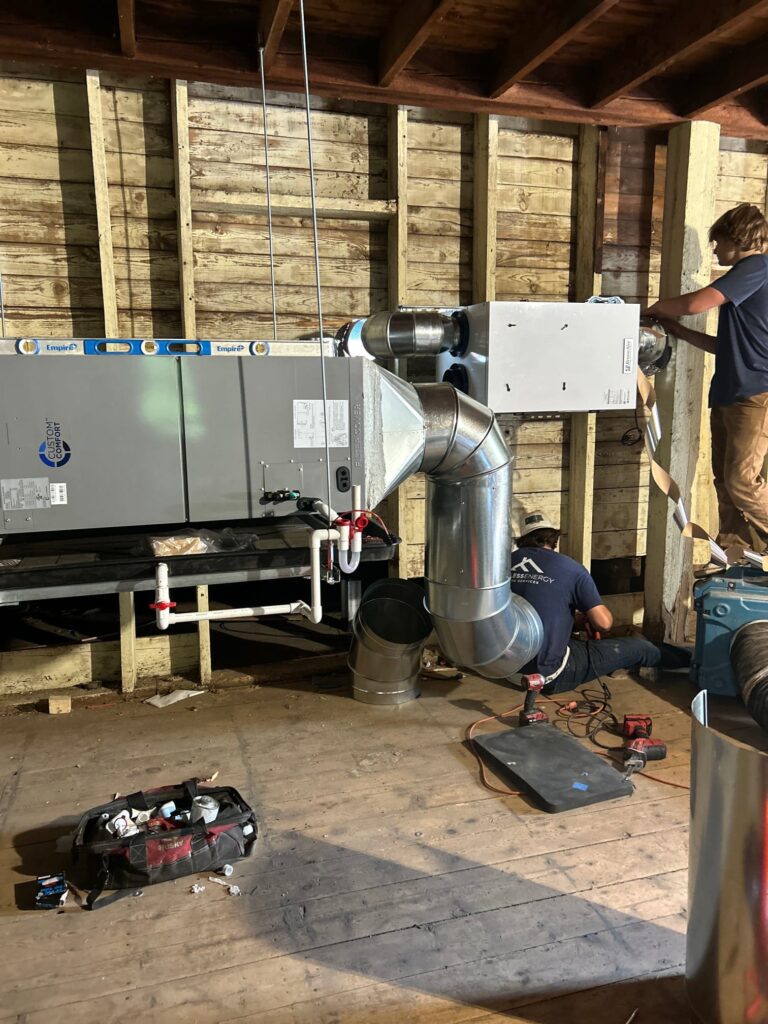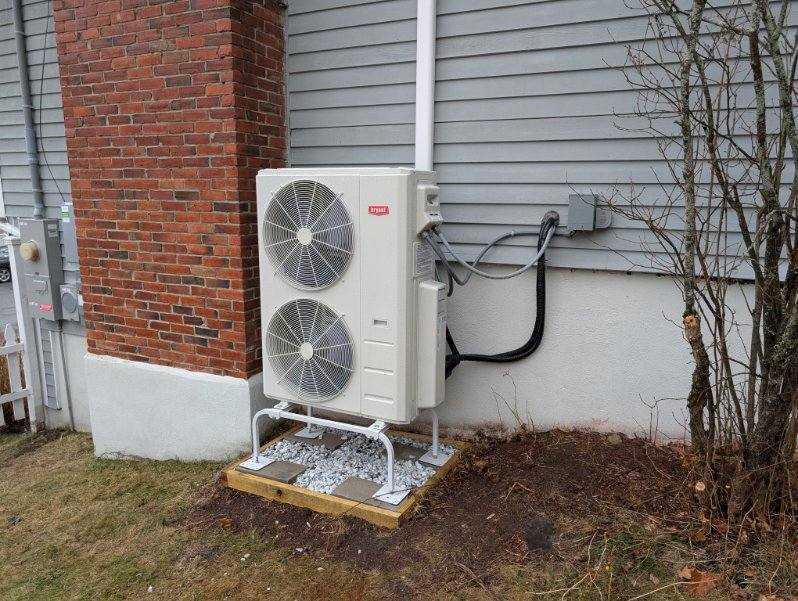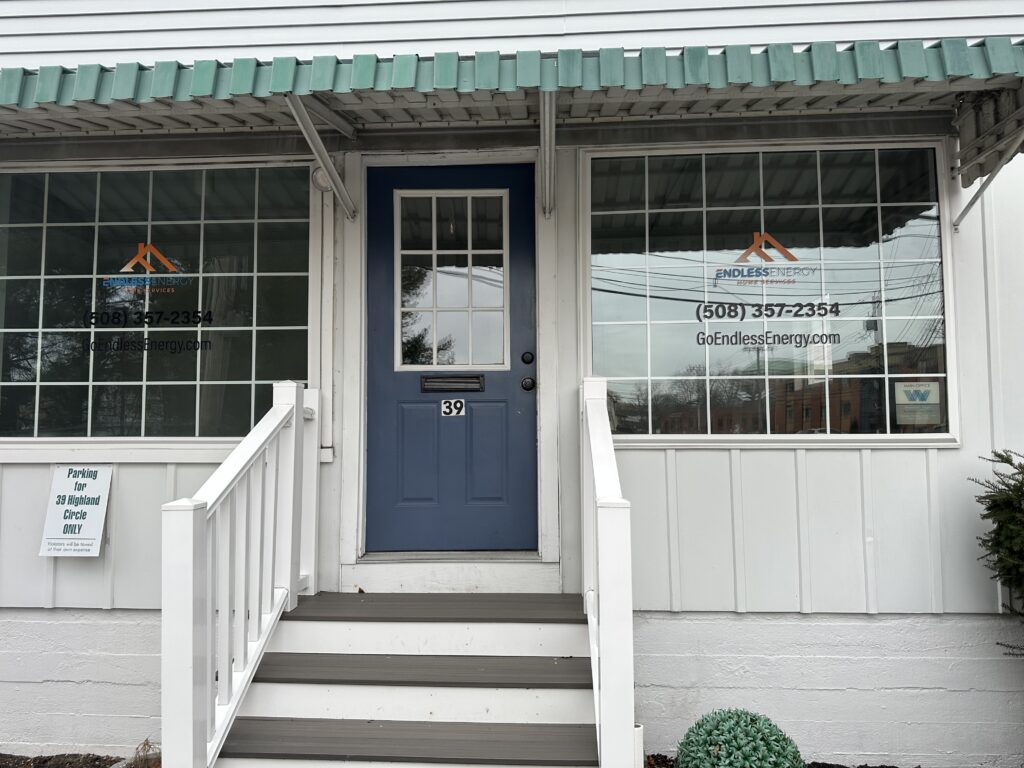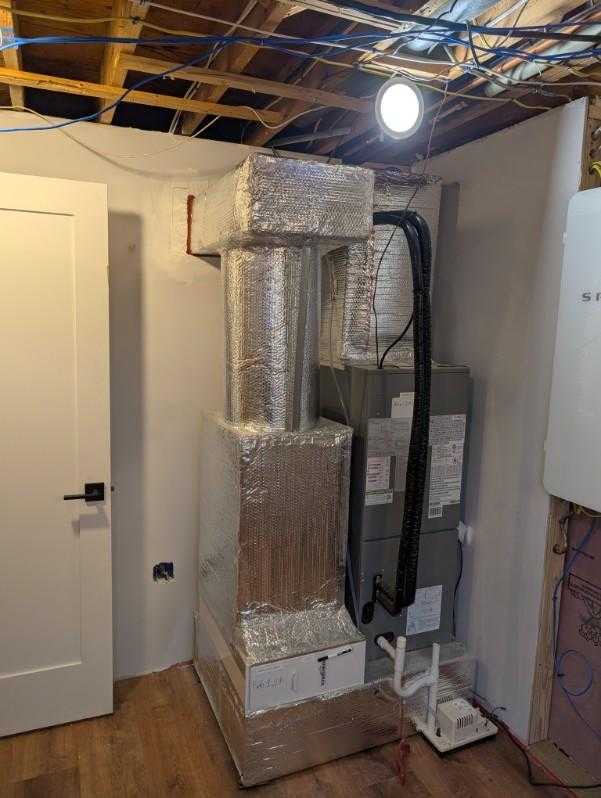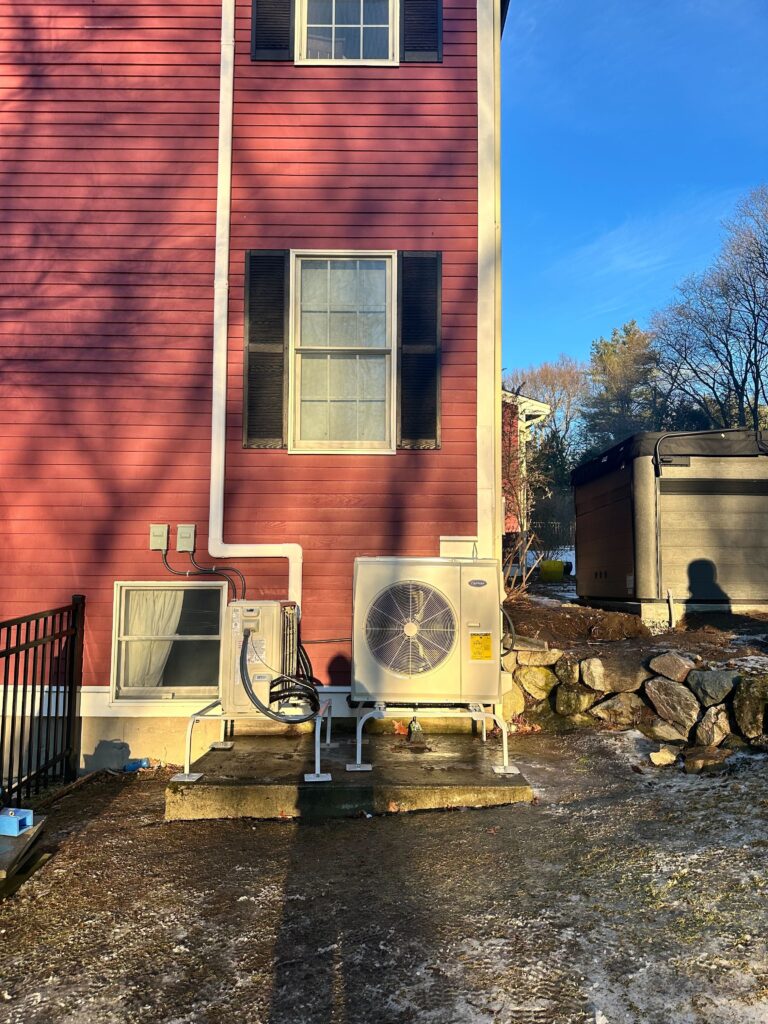“How big of a heat pump do I need?” It’s the first question almost every homeowner asks an Endless Energy heat pump specialist when they call our office about upgrading their heating system. And honestly? It’s not as straightforward as you might think.
Last week, a homeowner in Newton called convinced he needed a 5 ton LG central heat pump system, generally the biggest residential heat pump we sell, for his 2,400-square-foot colonial. Turns out, after our assessment, a mid-size unit 3 ton unit was perfect for his home’s actual heating needs. He would have wasted thousands on an oversized system that would cycle on and off constantly, never reaching peak efficiency.
Getting the size right matters more than most people realize. Too small, and you’ll be cold in January. Too big, and you’ll have hot and cold spots, higher electric bills, and a system that wears out faster than it should.
Here’s what Endless Energy’s comfort advisors consider when sizing heat pumps for Massachusetts homes — and why square footage alone doesn’t tell the whole story.
Why Square Footage Isn’t Enough
Walk into any big box store and they’ll hand you a chart: “1,500 square feet = X BTUs.” But those generic sizing guides ignore everything that actually matters for Massachusetts homes.
Take two identical 2,000-square-foot colonials in Wellesley. One was built in 1985 with decent insulation and newer windows. The other dates to 1925 with original single-pane windows and minimal insulation. The heating loads between these homes could differ by 40% or more, even though they’re the same size.
Our technicians run detailed heat load calculations that factor in:
Your home’s construction: Older Massachusetts homes — especially those beautiful colonials and Victorians in Concord, Lexington, and Cambridge — often need more heating capacity per square foot than newer construction.
Insulation levels: A well-insulated home in Needham might need a 2-ton heat pump where a poorly insulated home of the same size needs 3 tons.
Window quality and quantity: Those big south-facing windows in your Brookline brownstone? They’re adding heat load that square footage calculations miss entirely.
Ceiling height: High ceilings mean more air to heat and cool. Your 2,000-square-foot home with 10-foot ceilings has significantly more volume than one with 8-foot ceilings.
Local climate factors: Even within Massachusetts, heating needs vary. A home in the Southborough faces different temperature extremes than one in coastal areas.
How We Actually Size Heat Pumps
When our team comes out for an assessment, we’re not just measuring rooms. We’re doing what’s called a Manual J load calculation — the industry standard for proper equipment sizing. We also use the latest technology with leverages Lidar scanning of your home to enhance our accuracy.
Room-by-room analysis: We measure every space, note window locations and sizes, check insulation levels where accessible, and identify potential air leaks.
Construction details: Age of the home, wall construction, roof type, basement conditions — all of this impacts how much heating and cooling capacity you actually need.
Existing system performance: If your current furnace or boiler struggles to keep up, that tells us something. If it seems oversized for your actual needs, that tells us something else.
Lifestyle factors: Do you keep your Framingham home at 68°F or 74°F? Do you use all the rooms or close off sections in winter? These preferences affect sizing decisions. Keep in mind if we are designing a system that you want to qualify for Mass Save rebates, there are specific design parameters that we must follow!
Future changes: Planning to add insulation or replace windows? We factor that into our recommendations so you’re not oversized after efficiency improvements.
Common Sizing Mistakes We See
Going too big “just to be safe.” Bigger isn’t better with heat pumps. An oversized system cycles on and off frequently, never reaching peak efficiency. You end up with uneven temperatures and higher operating costs.
Matching the old system size. Your existing furnace might be oversized — many older systems are. Just because you have an 80,000 BTU furnace doesn’t mean you need an equivalent-sized heat pump.
Ignoring ductwork capacity. Sometimes the limiting factor isn’t the heat pump itself, but whether your existing ducts can handle the airflow requirements. This is especially common in older homes in Newton, Natick, and Waltham where ductwork was added as an afterthought.
Forgetting about cooling needs. Heat pumps provide both heating and cooling. Your heating load might suggest one size while your cooling needs point to another. We design for both seasons.
What Size Heat Pump Do Most Massachusetts Homes Need?
While every home is different, here are some general ranges our technicians see:
1,000-1,500 sq ft homes: Typically 1.5 to 2.5 tons, depending on construction and efficiency 1,500-2,500 sq ft homes: Usually 2 to 3.5 tons 2,500-3,500 sq ft homes: Generally 3 to 4.5 tons 3,500+ sq ft homes: Often 4+ tons, sometimes requiring multiple units
But remember — these are rough guidelines. We’ve installed 3-ton systems in 2,800-square-foot homes in Sudbury that heat beautifully, and 4-ton systems in 2,200-square-foot homes in Marlborough that were necessary due to poor insulation and air sealing.
Ductless vs. Ducted Sizing Considerations
Ductless mini splits offer more flexibility in sizing because you can install different capacity indoor units in different zones. A large living area might get a 12,000 BTU head while bedrooms get 9,000 BTU units. This allows for better comfort control and energy efficiency.
Ducted systems need to be sized for the total home load, but the distribution depends on your ductwork design. Sometimes we recommend making duct design alterations to ensure your system works properly. While it is your choice whether to move forward with those recommendations, we make them when we truly believe it will impact the performance of your heat pump system.
The Cost of Getting It Wrong
Undersized systems run constantly in extreme weather, struggle to maintain comfortable temperatures, and wear out faster from overwork. Your Ashland colonial might stay at 65°F when you want 70°F, no matter how long the system runs.
Oversized systems cycle on and off frequently, never reaching peak efficiency. They also don’t run long enough to properly dehumidify in summer, leaving your Hopkinton home feeling clammy even when it’s technically cool enough.
Either scenario costs you money — either in comfort or efficiency.
Why Professional Sizing Matters
Heat pump sizing involves dozens of variables that interact in complex ways. Endless Energy’s technicians use specialized software that considers all these factors simultaneously, something you can’t replicate with online calculators or rules of thumb.
Plus, proper sizing affects your rebates. Mass Save requires load calculations for rebate eligibility, and incorrectly sized systems may not qualify for the full incentive amounts.
Getting It Right the First Time
When you’re investing in a heat pump system — especially with Massachusetts rebates of up to $10,000 and federal tax credits of up to $2,000 available in 2025 — sizing matters more than the equipment brand or even the installation quality.
The best heat pump in the world won’t perform well if it’s the wrong size for your home.
Our assessment process includes a complete load calculation, ductwork evaluation (if applicable), and recommendations tailored to your specific home and comfort preferences. We’ll tell you exactly what size system makes sense and why, so you can make an informed decision. You can preview what your visit with an Endless Energy Comfort Advisor will look like in the video below!
Don’t guess on something this important. The difference between a properly sized system and one that’s even slightly off can mean thousands in operating costs over the system’s lifetime.
Ready to find out what size heat pump your Massachusetts home actually needs? Contact Endless Energy’s team for a no cost, no pressure heat pump consultation. We’ll measure, calculate, and give you straight answers about what works best for your specific situation.
Ready to explore installing heat pumps in your home. Endless Energy serves homeowners and businesses throughout most of Massachusetts in towns and cities including Boston, Brookline, Northborough, Framingham, Sharon, Reading, Concord, Newton, and Braintree. Call Endless Energy at 508-463-4406 or visit www.goendlessenergy.com to schedule your free heat pump sizing assessment.
